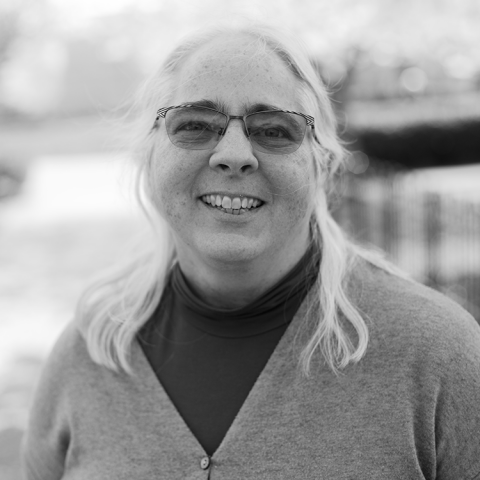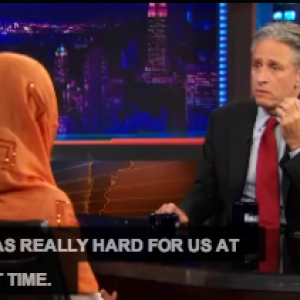
Rose Marie Berger is a Catholic peace activist and poet. She has been on Sojourners staff since 1986, and worked for social justice movements for 40 years. Rose has rooted herself with Sojourners magazine and ministry. She has written hundreds of articles for Sojourners and other publications and is a sought after preacher and public speaker. After living in Washington, D.C., for 35 years, she moved to Oak View, Calif., in 2022.
Rose’s work in Christian nonviolence has taken her to conflict zones around the world. She is active in the Catholic Nonviolence Initiative, a project of Pax Christi International, and served as co-editor for Advancing Nonviolence and Just Peace in the Church and the World, the fruit of a multiyear, global, participatory process to deepen Catholic understanding of and commitment to Gospel nonviolence. Her poetry has appeared in the books Watershed Discipleship: Reinhabiting a Bioregional Faith and Practice and Buffalo Shout, Salmon Cry: Conversations on Creation, Land Justice, and Life Together. She is author of Bending the Arch: Poems (2019), Drawn By God: A History of the Society of Catholic Medical Missionaries from 1967 to 1991 (with Janet Gottschalk, 2012), and Who Killed Donte Manning? The Story of an American Neighborhood. She has also been a religion reviewer for Publishers Weekly and a Huffington Post commentator. Her work has appeared in National Catholic Reporter, Publishers Weekly, Religion News Service, Radical Grace-Oneing, The Merton Seasonal, U.S. Catholic, and elsewhere. She serves on the board of The International Thomas Merton Society.
With Sojourners, Rose has worked as an organizer on peace and environmental issues, internship program director, liturgist, community pastor, poetry editor, and, currently, as a senior editor of Sojourners magazine, where she writes a regular column on spirituality and justice. She is responsible for the Living the Word biblical reflections on the Revised Common Lectionary, poetry, Bible studies, and interviews – and oversees the production of study guides and the online Bible study Preaching the Word.
Rose has a veteran history in social justice activism, including: leading the first international, inter-religious peace witness into Kyiv, Ukraine, following the outbreak of war in 2022, organizing inter-religious witness against the Keystone XL pipeline; educating and training groups in nonviolence; leading retreats in spirituality and justice; writing on topics as diverse as the “Spiritual Vision of Van Gogh, O'Keeffe, and Warhol,” the war in the Balkans, interviews with Black activists Vincent Harding and Yvonne Delk, the Love Canal's Lois Gibbs, and Mexican archbishop Ruiz, cultural commentary on the Catholic church and the peace movement, reviews of movies, books, and music.
Rose Berger has taught writing and poetry workshops for children and adults. She’s completed her MFA in poetry through the University of Southern Maine’s Stonecoast program. Her poetry has been published in Sojourners, The Other Side, Radix and D.C. Poets Against the War.
Rose grew up in the Central Valley of California, located in the rich flood plains of the Sacramento and American rivers. Raised in radical Catholic communities heavily influenced by Franciscans and the Catholic Worker movement, she served for nine years on the pastoral team for Sojourners Community Church; five as its co-pastor. She directed Sojourners internship program from 1990-1999. She is currently a senior editor and poetry editor for Sojourners magazine. She has traveled throughout the United States, and also in Ukraine, Israel/Palestine, Costa Rica, the Netherlands, Northern Ireland, Bosnia, Kosova, Peru, Colombia, Venezuela, and El Salvador visiting primarily with faith communities working for peace in situations of conflict.
Rose was born when atmospheric CO2 was at 319.08 ppm and now lives with her wife Heidi Thompson in Oak View, Calif., in the Ventura River watershed on traditional Chumash lands. Learn more at rosemarieberger.com.
Rose’s articles include:
- Pursuing the Secret of Joy: What is joy when it's not promiscuously tied to happiness, Hallmark, or hedonism?
- Why Our Faith Delegation went to Ukraine?: Our public message was simple: “We have come to Kyiv in solidarity to pray for a just peace.”
- Nonviolence in Najaf?: Will we recognize an Islamic peace movement when we see it?
- Of Love's Risen Body: The poetry of Denise Levertov, 1923-1997
- Glimpses of God Outside the Temple: The spiritual vision of Vincent Van Gogh, Georgia O'Keefe, and Andy Warhol.
- Damnation Will Not Be Televised: Almost everything I know about hell I learned from watching Buffy the Vampire Slayer
Speaking Topics
- Christian nonviolence, peace, war
- Catholic Nonviolence Initiative
- Climate change, creation care, watershed discipleship
- Bible study, liturgical year
- Poetry
- Spirituality and social justice
- Any topic covered in Sojourners magazine
- Catholicism
Speaking Format
- Preference for virtual events, but willing to discuss in-person events on case-by-case basis
Posts By This Author
On Being a Child of the Freedom Struggles
In the fall of 1981 I was a freshman at the University of California, Davis. It didn’t take long for me to step into the “Free South Africa” divestment movement sweeping the U.C. system.
I already had some traction with political protest. My first “demonstration” that I can remember was the 1966. I was 3 years old and it was the United Farm Workers march on the California state capitol in Sacramento. I was — and still am — a child of La Causa.
The University of California system had billions of dollars invested in South Africa — as did many U.S. and international corporations and governments. The aim of the divestment movement was to “drain the swamp of the apartheid regime.” The African National Congress and the South African church movement were calling for divestment and sanctions against the South African apartheid regime — even though it would but additional burdens on ordinary people. Millions around the globe responded.
The divestment movement spread like wildfire through the U.C. system. We had regular noon rallies outside the administration offices. And more than once in my college career we blocked the steps to Sproul Hall and were subsequently arrested by campus police with the Davis city police looking on.
Talking Taboo: The Christian ‘Lean In’?
Pope Francis Asks Global Catholics What They Think
In an unsurprising move, last week Pope Francis issued a questionnaire of sorts to the world’s Catholics to find out what we think about issues related to the family. He wants to know what we think about contraception, same-sex unions, and communion for divorced and remarried couples.
The Vatican has asked the world’s bishops to distribute the survey “immediately and as widely as possible to deaneries and parishes so that input from local sources can be received,” according to a letter from Archbishop Lorenzo Baldisseri, secretary of the Synod of Bishops. A copy of Baldisseri’s letter was obtained by National Catholic Reporter.
Water Is Not A 'Privilege,' Says Catholic Bishop
Is access to clean water for public use a human right? According to Luis Infanti, the Roman Catholic bishop of Aysen in Chile, the answer is yes. This week marks the opening of Chile’s “First Cabildo for Water,” a meeting organized by the Coalition for the Defense of Water and Life, comprising civil society and religious groups.
People from all over Chile are attending and bringing water samples taken from lakes, streams, and rivers in their communities to be blessed by Bishop Infanti. “Water has often been captured, kidnapped and commodified,” said Infanti, according to Agenzia Fides, “but we know that it must give life and reach all our brothers and sisters, flow in abundance and not be anyone’s privilege.”
Jon Stewart to Malala Yousafzai: 'Can I Adopt You?'
Just as she left the world speechless when she addressed the United Nations in July, Malala Yousafzai, the 16-year-old Pakistani advocate for women’s rights and access to education, rendered America's jester Jon Stewart tongue tied when he hosted her this week on The Daily Show with Jon Stewart. Her new book I Am Malala is just released.
"Education is the power of women. That's why the terrorists are afraid of education. They do not want women to get education because then women would become more powerful," said Malala, who is nominated for the Nobel Peace Prize to be announced this week.
The Taliban first targeted Malala on "Googlenet" in 2012, she said. But she decided that it was better to not respond to the threats with violence, even in self-defense.
"If you hit a Talib with your shoe, then you will be no better than the Talib," she told a star-struck Stewart.
"Can I adopt you?" Stewart asked.
The Daily Show
Get More: Daily Show Full Episodes,The Daily Show on Facebook
Unlawful Entry
OFFICER MARIO normally worked for Homeland Security. On this Friday night he’d been seconded to the Washington, D.C. Metro police, who had their hands full. Not only did they have the usual “drunk and disorderlies,” but now 54 people who looked like card-carrying members of the AARP were filling up their holding cells. Officer Mario, of retirement age himself, was feeling fortunate. He’d been assigned to the women’s side.
“Ladies, ladies, ladies!” Mario said, sauntering in with a mischievous smile. “This must be my lucky night.”
The evening before, we’d all been at St. Stephen and the Incarnation Episcopal Church running role plays on how to “flash mob” the corporate headquarters of Environmental Resources Management (ERM), the firm hired by the U.S. State Department to provide an environmental impact statement on the Keystone XL pipeline. To the disbelief and concern of climate scientists, ERM claimed that TransCanada’s Keystone pipeline would not significantly contribute to climate change. ERM was suspected of “misleading disclosures” regarding conflict of interest and material gain from the pipeline’s completion.
Our white-haired mob of mostly grandparents converged on ERM headquarters at noon to shine a light on such shady dealings. While six silver foxes blocked the elevators by chaining their arms together inside a PVC pipe, I watched two D.C. police lift Steve, age 70, and toss him into the crowd behind me. I knew this nonviolent civil disobedience wasn’t going as planned.
Top 10 Most Dangerous States for Women
Considering a move? Think twice if you are female, single, and headed toward any of the states below. According to data recently released by the Violence Policy Center, these are the states that have the highest murder rates of women by men.
...
What’s being used to murder us? Take a guess.
A 2002 study from researchers at the Harvard School of Public Health found that although the United States represented only 32 percent of the female population among 25 high-income countries, it accounted for 84 percent of all female firearm homicides.
The study’s lead author, Dr. David Hemenway, concluded that “the difference in female homicide victimization rates between the U.S. and these other industrialized nations is very large and is closely tied to levels of gun ownership. The relationship cannot be explained by differences in urbanization or income inequality.”
The Families of Colombia's 'False Positive' Victims Are Still Fighting For Justice
I was there with the NGO Justice for Colombia to hear about the country's 'false positives' scandal, which first broke five years ago and shows no sign of relenting any time soon. The scandal has its roots in the Colombian 50-year civil war between the government and the left-wing peasant insurgent group FARC. In the early 2000s, then-president Alvaro Uribe, out of an apparent concern for the army’s reputation, started putting pressure on soldiers to increase their kill figures.According to media reports, soldiers were promised cash payments and more vacation time if they produced the bodies of dead FARC guerrillas—an accusation the government denies. In an effort to increase their quotas, soldiers allegedly started luring young, impoverished men away from their homes with the offer of work. Once away from their families, the soldiers executed the men, dressed them up in guerrilla uniforms, and presented them as combat kills. Many victims were dismembered and buried hundreds of miles away from their families.
Read more.
Pipeline Prayer Walk: 'In the Wide Open Air'
'Why Are White People So Mean?'
The metro is crowded today, and the 20-something, well-dressed white man has to stand, one hand holding the bar and the other his smartphone. It’s the end of the day. All the commuters — but one — are turned toward home. The young man’s face, like most of the others, is dulled with exhaustion. No one makes eye contact.
In a seat near the door, one woman sits facing everyone, looking backward. She studies the young man’s face intently, uncomfortably. He shifts. She rearranges the bags at her feet. Her reflection in the window shows an ashy neck above her oversized T-shirt collar. The train hums and clicks through a tunnel. As if in preparation, she takes another sip from the beat-up plastic cup she’s holding.
At last, she raises her voice and asks: “Why are white people so mean?” Boom! The electricity of America’s third rail crackles through the train. Faces fold in like origami or turn blank like a screensaver.
Catholic Justice and Peace Commission Intervenes on the Recruitment of Christian Arabs into Israeli Army
...The army is used as "an institution that promotes social cohesion" and a "principal place" of forming national consciousness and participating in the nation building project "as conceived by the authorities, i.e. promoting Israel as a Jewish national state". In this perspective, according to the Justice and Peace commisssion operating in the Holy Land, "talk about drafting of Christian Arabs rather than the Arabs in general - Muslims and Christians - is clearly an attempt to drive a wedge between Christians and Muslims in Israel". On addressing these delicate problems, the Church should keep in mind that "the army is used as a means of imposing and maintaining the occupation of Palestinian territories and thus preventing Palestinians from achieving dignity and independence". The army is primarily "an army of aggression rather than an army of defense". Therefore "the use of army service to divide the Arab population against itself is detrimental to the interests of the Arabs as a community."
'Why Are White People So Mean?'
THE METRO IS crowded today, and the 20-something, well-dressed white man has to stand, one hand holding the bar and the other his smartphone. It’s the end of the day. All the commuters—but one—are turned toward home. The young man’s face, like most of the others, is dulled with exhaustion. No one makes eye contact.
In a seat near the door, one woman sits facing everyone, looking backward. She studies the young man’s face intently, uncomfortably. He shifts. She rearranges the bags at her feet. Her reflection in the window shows an ashy neck above her oversized T-shirt collar. The train hums and clicks through a tunnel. As if in preparation, she takes another sip from the beat-up plastic cup she’s holding.
At last, she raises her voice and asks: “Why are white people so mean?” Boom! The electricity of America’s third rail crackles through the train. Faces fold in like origami or turn blank like a screensaver.
But this was no rhetorical question. When no one answers, she asks again, this time aiming her question at the young man with his phone. A flush creeps up his neck. “You look like you could be a sheriff,” she says to him. “Good and mean. I can see it in your eyes. You got mean eyes.” When he realizes her attention is stuck on him, he replies, “I hope I’m not mean. I try to be good.”
A Step Closer to Global Jubilee?
In the green hills of County Fermanagh, Northern Ireland, the world’s leading developed nations agreed on Tuesday to make individuals and companies pay the taxes that they owe. With the release this morning of the Lough Erne Declaration the G8 countries plan to implement greater tax collection internationally through fairer tax policies, greater financial transparency, and open trade.
The G8 plans to clamp down on tax-evaders and require shell companies — often used to take advantage of tax loopholes or to invest money anonymously —to identify their effective owners or primary beneficiaries. Developing countries, reported CNN, lose more in tax avoidance than they receive in aid. With the protocols agreed to today, indebted poor countries will be given access to the global information they need to collect the taxes they are owed.
Some anti-poverty campaigners describe the G8 deal as a historic achievement.
Illuminated
On my knees I beg forgiveness for my greed—
and for starving myself.
By your eyes I see you love this priest,
follow his lyrical fingers in praise of
a small white host he points here,
there.
The Pope We've Been Waiting For?
I WAS 15 when Pope Paul VI died in 1978. He’d been pope my whole life. Elated at the election of John Paul, I followed his papacy with all the obsessive focus of a teenager. When he died 33 days later, I simply didn’t know what to think. (His book Illustrissimi, a collection of letters written to saints, novelists, and artists, is one I return to for insight on Catholic imagination.)
During John Paul II’s 27 years as pope (the second longest reign in papal history), a dangerous nostalgia for a pre-Vatican II church was encouraged to flourish.
Under Pope Benedict XVI, that nostalgia came to fruition. The Latin Mass was re-established in many parishes. Amid a worldwide sex abuse scandal, liturgical correctness and “fancy dress” were too often elevated over children’s protection, victims’ needs, and institutional transparency. Women and girls were pushed further off the altar. To be gay, female, divorced, or a single mother—all these pushed one further from the table of the Lord, rather than drawing one nearer.
And now we have Pope Francis. When Jorge Mario Bergoglio announced he would take the name Francis, after Francis of Assisi, I wept. To have the Poverello (the “poor one”) at the center of our Catholic faith is right and just—whether that poor one is a 13th century itinerant preacher or a child in the villas miseria around Buenos Aires.
The Church Defends Amazon Environment, Threatened by Market Interests
The Ecclesial Network for the Amazon, a Catholic church network representing 12 Latin American countries, met recently in Puyo, Pastaza, Ecuador, challenging unrestrained market forces that are decimating the Amazonian ecosystem. The Network has been established to provide on-the-ground facts about Amazonia's environment, indigenous communities, and to strengthen the church in the region. Agenzia Fides reports:
"Many people still think that there is an unlimited amount of energy and resources that can be used, and that the negative effects of the wild manipulation of nature can be easily absorbed. But this is totally false." Such attitudes, Catholic Bishop Julio Parrilla continued, "are not rooted in science or technology, but in a technocratic ideology that serves the interests of the market." The Bishop concluded by reiterating "the influence of secularization, because when man turns away from God, he falls into the temptation of thinking that everything is permitted, in order to meet one’s immediate needs and desires."
For God So Loved the World
NEW YORK CITY has been bombed at least twice in the past decade. First by al Qaeda and second by Hurricane Sandy.
In the wake of the Sept. 11 attacks, the United States launched two ground wars and a worldwide "war on terror." Within two months, Congress federalized the Transportation Security Administration to secure airports. More than 263 government organizations were either created or reorganized. Some 1,931 private companies were put to work on counterterrorism, homeland security, and intelligence. Rightly or wrongly, America moved heaven and earth to stop terrorism in its tracks. It was seen as both an ongoing threat and a moral affront that had to be dealt with.
What about Climate Change?
In February, a New York State Senate task force on Superstorm Sandy compared the hurricane that affected 24 states to the 9/11 terrorist attacks. "[On 9/11] there were more than 3,000 souls lost, but in terms of the geographic destruction, it was isolated to Lower Manhattan," said Sen. Andrew Lanza (R-Staten Island). "[After Sandy] we have miles and miles and miles of destruction. Hundreds of thousands of homes affected, 60 ... New Yorkers killed, 250,000 to 260,000 businesses affected."
Hurricane Sandy killed 253 people in seven countries. It was the second largest Atlantic hurricane ever recorded—and the most expensive. It smashed into the East Coast with barely three days' warning. Like hurricanes Katrina and Rita before it, Sandy was a disaster of biblical proportions.
After 9/11, Americans knew in our gut that something was seriously wrong. Our moral intuition had been sucker punched.
Keystone XL Would Divide Jobs, Conquer Low-Income and Native American Communities
When it comes to the Keystone XL pipeline, the oil and gas industry want you to believe that you have to choose between jobs and prairie grass. This tactic is called the “divide and conquer” or “divide and rule” strategy. It’s as old as the empires of ancient Greece and Rome. It still works because human nature hasn’t changed that much.
Two years ago I sat down across the table from Dr. Kerri-Ann Jones, the highest ranking State Department official (short of the Secretary of State) to weigh in on the Keystone XL pipeline permit process. A group of religious leaders were delivering thousands of petitions to Dr. Jones asking her to to stop the pipeline.
I said to her, "If this decision about the pipeline was made purely based on the climate science, we wouldn't be here having this discussion." She’s a scientist. She knows the score. She didn't disagree. “But,” she said, “everywhere we go across the country we hear about the need for jobs – especially in the middle of the country.”
Divide and conquer.
At the River We Stand
FROM THE RIVER to the rope. From the creek to the cross. From the dove and a "voice from above" to death by state execution and profound silence.
This is Lent. This is the Jesus Road, the Christian way. O Lord, how can we follow you?
Lent is time of remembering ourselves. In the ancient church, those preparing for baptism were publicly challenged: Do you renounce your bondage to Master Satan? Do you reject the slave-mind and all its glamour and subtle temptations? Will you allow Christ to buy your freedom?
The catechumen turned to face the east and the dawn, answering: "I give myself up to thee, O Christ, to be ruled by thy precepts."
It is Lent. We go down to the river to pray. We step into the waters of repentance. We surface as a new creature in Christ. From that moment onward, we imprint on Jesus. This is our survival strategy as newborn disciples. We follow him, like ducklings behind their mother.
After his baptism in the Jordan River, Jesus is driven straight out—into the unloved places, into the wilderness. There he is pricked by demons to toughen him up. He is being prepared. He must look into his own despair. Satan is the supreme surgeon for separating us from our hope.
Are Women the Secret Weapon in Battle for Food Security?
On Monday, Olivier De Schutter, U.N. special rapporteur on the right to food, submitted his report Gender and Food Security to the U.N. Human Rights Council, adding to the mountains of evidence that if you empower women with education and independent rights, they can substantially, cost-effectively, and generationally reduce hunger and malnutrition. The Guardian's Poverty Matters Blog reported:
The notion that gender equality can play an important role in reducing hunger and malnutrition has gained increasing traction in development circles. The UN's Food and Agriculture Organisation claimed in its 2010-11 State of Food and Agriculture report that equal access to agricultural resources could reduce world hunger by 12-17%. Gender and food security also came under the spotlight in the 2012 edition of the World Bank's flagship annual report, where it was argued that parity in areas including landrights, employment and political representation could improve development outcomes.
These ideas are not new. Obliged to raise children, care for sick and elderly people, and run households – work that, valued in monetary terms, would be equivalent to 15% of GDP in low-income countries, rising to 35% in middle-income countries – it has long been argued that women are being denied education opportunities, marginalising them both economically and politically. The challenge lies in convincing policymakers to do something about these multiple challenges.
Says De Schutter:
"We must address how gender roles are being defined within the family and who makes the decisions in government. ...We must refuse to take existing gender roles as givens, and instead allow women to shift the burden to men;where possible, giving women access to more opportunities and better training and education, and exposure to something other than the traditional responsibilities they have been assuming."
"If local NGOs and women's organisations and unions mobilise, using the report to put pressure on the government from below, that will be even more effective than international pressure."










